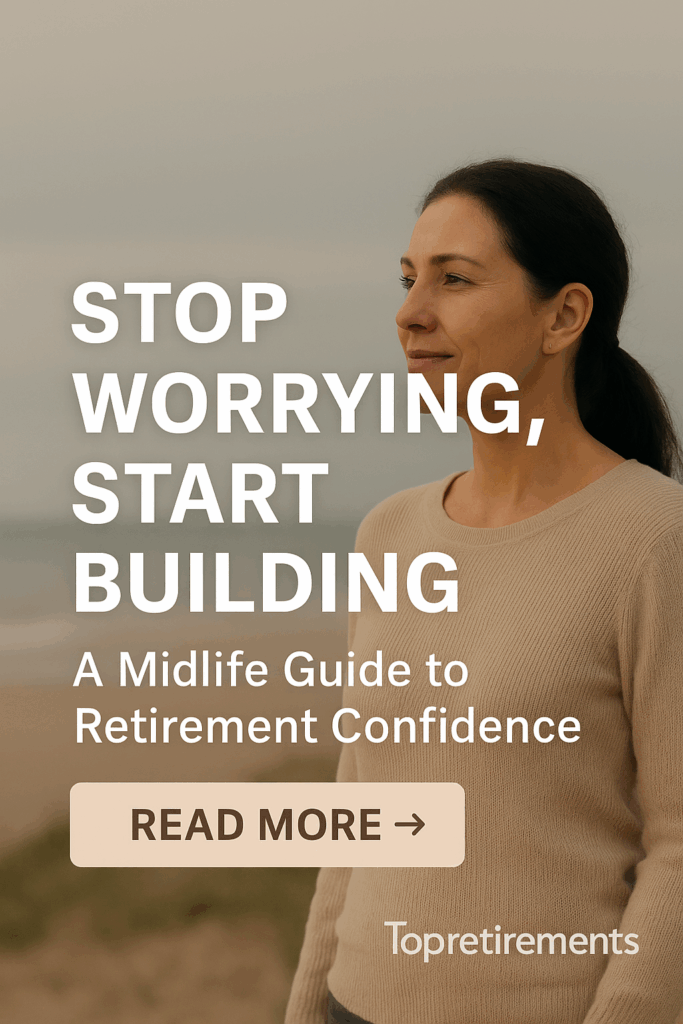Stop Worrying, Start Building: A Midlife Guide to Retirement Confidence
Category: Checklists
October 17, 2025 – Are you in your 40s and 50s and feeling stressed about retirement? Join the club – millions of others are feeling the same way.
Many people in their 40s or 50s wake up to the realization that retirement isn’t as far away as it once seemed. With rising living costs, uncertain markets, and increasing responsibilities like kids or aging parents, it’s no wonder so many people feel retirement anxiety.
The good news? You are young enough that you have plenty of time to retire confidently – if you take action right now. Here are some of the steps you can take to reduce that anxiety.
Why So Many 40-50 Somethings Feel Retirement Anxiety
Let’s be real — turning 40 is a wake-up call. Retirement, once a distant idea, is now something you can almost see on the horizon.
Here are common reasons people in thei feel anxious about retirement as they reach the midpoint of their working careers.
- Feeling behind on retirement savings
- Uncertainty about how much they’ll need to retire
- Lack of a clear financial plan
- Worries about Social Security or healthcare costs
- No idea how to catch up
- When they should retire
According to a recent Northwestern Mutual study, 60% of Americans feel financially anxious about retirement — and the 40s and 50s are often the peak years of concern.

How to Take Control of Your Retirement Anxiety
The key to reducing retirement anxiety is turning fear into action. You don’t need to have it all figured out — you just need a realistic plan and the right steps.
Step 1: Know Your Number
How much do I need to retire. Most experts suggest aiming for 10–12x your annual salary saved by retirement age.
If you’re 40 now and earn $80,000 a year, that means you’ll need $800,000 to $1 million by retirement.
 Use an online retirement calculator to get a personalized estimate. Many free tools factor in inflation, age, and income. Try this Retirement Calculator at Vanguard, it’s very good.
Use an online retirement calculator to get a personalized estimate. Many free tools factor in inflation, age, and income. Try this Retirement Calculator at Vanguard, it’s very good.
Step 2: Boost Your Retirement Savings — Now
Retirement savings, 401(k), Roth IRA, best retirement accounts
Into your 50s, time is still on your side — but now is when you need to ramp up your contributions.
- Maximize your 401(k): Try to contribute 15% of your income if possible. If there is a company match, contribute the maximum.
- Open a Roth IRA: Tax-free growth can give you more flexibility in retirement. Consider putting more of your contributions here – when you get into your 70s the withdrawals you are required to take from regular IRAs and 401(k)s are taxable, and can be substantial.
- Automate savings: Set it and forget it, so you’re not tempted to skip months. If you get a raise, add some of that to your savings.
- Consider how you invest. At this point you can be fairly aggressive with stock index funds – historically they grow faster than CDs or bonds, and time is on your side.
Even increasing your savings by $200/month in your 40s could add up to over $100,000 by the time you retire, thanks to compound growth.
Step 3: Get Clear on Your Expenses
Retirement budget, cost of living in retirement
Understanding how much you’ll spend is just as important as knowing how much to save.
Start estimating your future monthly expenses:
- Housing (mortgage, rent, or paid off?)
- Health insurance / out-of-pocket costs
- Travel or hobbies
- Everyday essentials
Create a rough retirement budget and adjust it over time as your situation changes. Note that your expenses might not decrease that much in retirement – travel, recreation, and medical expenses could make up the difference.
Step 4: Protect What You’re Building
Life insurance, disability insurance, emergency fund
You’re likely at the peak of your earning years — protect your income and family.
- Life Insurance: Especially if you have kids or a spouse depending on your income
- Disability Insurance: One accident can derail your savings
- Emergency Fund: Aim for 3–6 months of expenses in case of job loss.
Step 5: Think About Your Social Security Claiming Strategy
There is a big difference in how much your benefit will be. The younger you claim, the less you get:
- The earliest you can claim is age 62
- Your Full Retirement Age is 67
- Every year you wait to claim from age 67 to 70 means an 8% increase
- Your spouse’s life expectancy might be more important than yours in making your decision
- If you wait to claim you will need other funds to live on.
Step 6: Make a Plan — And Write It Down
Retirement planning checklist
Even a simple written plan reduces anxiety because it gives you a sense of direction.
Retirement Anxiety Checklist for 40-50-Somethings
Use this quick checklist to take back control — one step at a time:
 I know roughly how much I need to retire (my “number”)
I know roughly how much I need to retire (my “number”)
 I’ve checked how much I currently have saved
I’ve checked how much I currently have saved
 I’ve increased or automated my retirement contributions
I’ve increased or automated my retirement contributions
 I’m using retirement accounts (401(k), IRA, Roth IRA)
I’m using retirement accounts (401(k), IRA, Roth IRA)
 I’ve created a rough retirement budget
I’ve created a rough retirement budget
 I have basic insurance (life, disability, health) in place
I have basic insurance (life, disability, health) in place
 I have an emergency fund with at least 3–6 months of expenses
I have an emergency fund with at least 3–6 months of expenses
 I’ve considered meeting with a financial advisor
I’ve considered meeting with a financial advisor
 I’ve written down a retirement savings plan with yearly goals
I’ve written down a retirement savings plan with yearly goals
 Print this checklist or save it digitally — revisit it every 6–12 months.
Print this checklist or save it digitally — revisit it every 6–12 months.
Final Thoughts: You’re Not Too Late
Being in your 40s means you still have 20+ working years to make up ground and build a solid future. The most important step is to start today, no matter where you are.
Retirement anxiety is real — but with the right moves, retirement confidence is absolutely possible.
Want More Help?
- Subscribe to Topretirements Best Places newsletter for weekly retirement tips
Comments? What is your top source of retirement anxiety, and what are you doing about it.






Comments on "Stop Worrying, Start Building: A Midlife Guide to Retirement Confidence"
Chris says:
It is very pleasing to me to see my children and most of their peers are very interested in preparing for their retirements. With the knowledge they are not going to get a pension, they are doing a better job than us boomers, contributing regularly to their 401(k)s early and taking advantage of company matches. Well done. More has to be done to help those who don't have 401(k)s, they are going to have a very hard time surviving.
Jan Cullinane, author says:
Great points. Keep in mind that you may be spending 20 or more years in retirement, so along with "Do I Have Enough" and "Have I Had Enough," be sure you are confident that you can answer "Do I Have Enough to Do." This is an area of planning that many people don't seriously consider. You may have 20 or more years to happily and purposely fill the gap that working provided. Jan Cullinane, author of The New Retirement: The Ultimate Guide to the Rest of Your Life (Wiley) and The Single Woman's Guide to Retirement (Wiley).
Admin says:
A new report from CNBC finds that members of Gen X (born between 1965 and 1980) are in the worst shape when it comes to retirement preparation. Their typical retirement savings are only $40,000, which is far from what they need in a time with escalating healthcare and college costs. The oldest members of this generation will be 60 years old this year. Overall, 69% of Gen X workers said they were behind on their retirement savings, including 47% who said they were “significantly behind” — more than any other generation, according to a separate retirement report by Bankrate.
One of the big reasons why Gen X is in such trouble is that this sandwich generation grew up in an era when fixed pensions (defined benefits) were a commonplace, replaced by 40(k)s. Another is that they have lived through multiple recessions which interfered with their building nest eggs.
RichPB says:
The times are difficult. There have been several key points in my life that seemed so bad it was impossible to get through. I fortunately got help the first time which showed me the way. Get up and do something about retirement. Start. Don't stop. This article is a great pathway.
Patricia Mc says:
I have always wondered why retirement investments are not taught in school. Our parents could not teach us because no one taught them. How to learn about a rather complicated subject, all on our own, seems a ridiculous omission in our education. Yes, there are books, but I am an avid reader and the books were impossible. I found myself reading the same paragraph over and over, and not retaining it, ultimately giving up. Maybe it was the writing, but I tried learning in good faith, and those living paycheck to paycheck cannot afford financial advisers.
JCarol says:
Patricia, it's true no one taught our parents about investing for retiring, but many in that generation figured it out. In my late twenties, a close family friend talked to me about it when I was at his mortgage-burning party. He gestured to his house and told me that without having a paid off house, retirement would be very difficult. I never forgot his advice and advised my children likewise.
When in my 40s and 50s, if someone asked me how I felt about my financial retirement position, I'd have reported being unsettled. However, by the time I hit my early 60s things were looking up.
Not to get overly political here, but my children — all in their 40s — have significant 401Ks that they've plugged religiously since their mid-twenties. Nevertheless, all have great anxiety about their lives and finances being negatively affected by impulsive federal leadership that changes the rules overnight.
Their generation is buzzing amongst themselves about this being the second Gilded Age that will shortly be followed by some manner of Great Depression. Our concern that they might be right has kept my husband and me in our large, paid off house, so if things collapse we can muster through together.
Patricia McDougall says:
JCarol: I'm happy that you and your children are going to be okay. But I remember interviewing in large law firms all over San Francisco and every one of them said that no, they didn't have a 401k plan, but they were looking into it. There was a substantial gap between the disappearance of pensions and the onset of the alternative 401k plans. They are still not teaching retirement investment and planning in school.
JCarol says:
Patricia, I apologize for being unclear. I never had a 401K or a pension. When working for other companies in the 1970s & early 80s, 401ks didn't exist and few private employers still offered pensions. Mine sure didn't. However, many offered good (free) medical insurance, including my employers. Adding my husband to the policy was relatively inexpensive.
Come the mid-80s, our small business supported us so I didn’t work for others after that. Retirement savings were managed the old-fashioned way, i.e., without corporate assistance. Eye-watering medical insurance premiums increased steadily while coverage eroded. That is, until the ACA was passed. Thank heavens for that law.
My children work for medium to large companies. All have had 401Ks since graduating college and transitioning from part-time jobs to career work.
I agree – big changes in the 1980s made life much harder for the 99%.
Somewhat paternalistic attitudes toward employees shifted to an unapologetic, laser focus on corporate greed with the bonanza to be shared up, not down. Board members, C-suite executives and stockholders benefited, but woe to lower level employees. Some were laid off to improve the bottom line, so remaining employees’ workloads increased while their compensations remained static.
I don't disagree that general investing, money management and financial planning should be taught in high school (few 16 year olds can project 50 years forward, so maybe not a heavy focus on retirement).
Admin says:
Note: Unfortunately this discussion turned a little political and not relevant to retirement prep. So we edited a few comments and deleted another one that responded to it. Sorry about that - let's keep to planning - it's hard enough!
RichPB says:
Admin, I appreciate the efforts to manage out politics -- Thank You!
BUT ... There are thousands (millions?) like me who have tried to reasonably prepare for retirement, have weathered some of the vicissitudes of retirement, yet now live with some despair, considerable shock and basically non-stop concern (at a minimum -- many face non-stop worry) that the political situation, including attendant inflation, appears to be actively intent on destroying our futures. How do we "retirement plan" for this?
RichPB says:
In answer to my own question, read "The Diary of Anne Frank". Imagine what her retirement plan or her family's might have been.
Mike says:
Admin, if you feel it necessary to edit comments it should be noted in the comment it was done and why.
Admin Comment: Fair enough. It is quite rare for us to anything, and we will mention it when we do. Good reasons why we do that came up recently when someone mentioned Ronald Reagan and Republicans in a bad way, which got a lot of other people hot under the collar. We took that comment out, it didn't add anything to the conversation while throwing gasoline on the fire. If a response to something that is either completely off target or gets into political rants or blatant conspiracy theories, we will delete it (and not mention that).
Simply put, we aren't a site where political opinions are welcome on either side. Let's stick to retirement and all get along together. Thanks for your patience and contributions to this site, one and all!
Daryl says:
Admin, today’s incendiary politics are exactly what the ruling class have been striving for: to turn the commoners against each other so they won’t eat the uber rich. So now you can’t discuss a policy without insulting someone’s identity. Divide and conquer.
JCarol says:
Admin, as long as you're doing a little editing, would you mind fixing a typo I made in my second post?
The ending phrase in my first sentence in the second to last paragraph should read, "with the bonanza to be shared up, not down."
I didn't include the word "up" toward the end of the sentence, a word that's important to my point. .
Thanks!
Admin: All set, glad to help.
Stevo says:
Being well in to my retirement there are some things that I would have done differently when saving for it. The first is putting the max into a ROTH IRA. The RMD situation can really bit take a bite out of your retirement income if you have too much in a 401K especially since I can't see how taxes won't go up in the near future. This affects your taxes as well as Medicare costs. Returns from years of building investment income, pensions and SS can add up much more than you anticipated.
The second thing I would have done is enroll into a high deductible healthcare plan and max out an HSA that I would have used as a tax free investment plan. This involves investing it, not using it for expenses if possible. After 20 or so years of medium returns you'll have a good pool of money to use for future healthcare spending. A high deductible plan will cost you just as much as spending that money up front and if you don't have a lot of medical expenses you may pay less. JMHO
To Admin: Thanks for keeping politics out of the discussion. All of the political dogma on the Internet these days is exhausting.
RichPB says:
Stevo, you point about maximizing Roth IRA is very important. Roth was new before we retired and we had only a minimum (~$1500) in that account compared to our primary savings. And yes, the RMD bite is big.
Admin Comment: So true. One of my biggest retirement mistakes was not putting more of my 401(k) contributions to Roth rather than regular. The short term tax benefit for contributions to regular plans to what those for Roths in the long term. Even for your heirs.
Danno says:
One limitation with the Roth is the income limits. If you earn above the income limit, you cannot contribute to a Roth thus are limited to the standard 401K and IRA. You may either realize the tax savings when younger/working and pay more taxes when older/retired OR pay more taxes when younger/working and save on taxes when older/ retired.